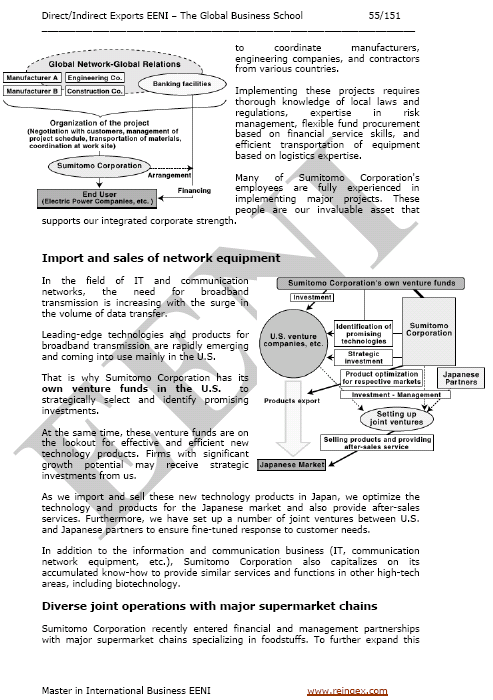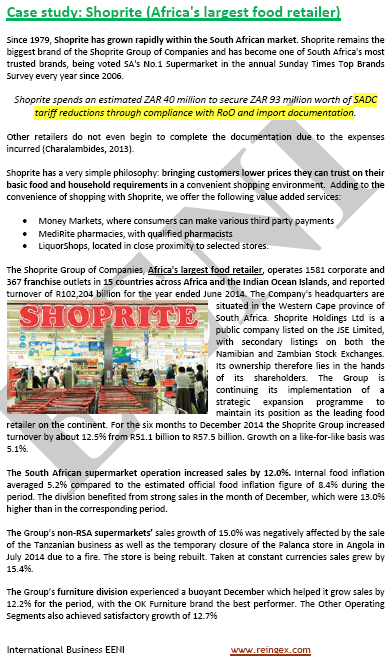International Distribution, Importers, Exporters

Global Distribution. Export Channels. Sales subsidiary. Franchises
The Subject “International Distribution” consists of three parts:
1- International Distribution.
- Introduction to the international distribution policy
- Indirect exports
- Consultancy
- Associated exports
- Export Consortia
- Trading companies
- Distribution and e-business. Going international with the e-business
- Case Study:
- Sogo Shoshas and Chaebols
- Toshiba
- The third Italy
- Mitsubishi Corporation
- Sanofi-aventis
2- Direct exports.
- Importers and distributors
- Representative
- Company personnel
- Foreign subsidiaries;
- Sales
- Production
- Internationalization
- Licences
- Franchises
- Other distribution channels
- Case Study:
- Set up a business in Costa Rica
- Sumitomo
- Itochu
- Rolls-Royce
- Renault-Nissan Alliance
- 7-Eleven
- Mango
- International Distribution networks in the centralized economies
- Shoprite (African largest food retailer)
3- International Sales Network Management.
- Selection criteria for searching representatives and distributors
- Profile of the representative/international distributor
- Representation and distribution contracts
- Recruitment methods
- Control of work of the representative
- International Sales:
- Purchasing departments
- Delegated agents
- Case Study
- Exclusive agent in two markets.
- “Grey” Networks
- Electrolux India
The objectives of the subject “International Distribution” are the following:
- To learn about the importance of planning an appropriate international distribution strategy when entering new export markets
- To identify the distribution options available to the exporter
- To outline the criteria to be used when selecting a distribution channel
- To analyze the strategies that can be implemented for the consumer and/or industrial products
- To select the channel options, that may be used when entering new export markets
- To examine the direct and indirect export channels open to the exporter
- To analyze the functions of the importers and representatives
- To discuss the use of a company personnel and sales or production subsidiaries
- To explore franchising, licensing, and other channels
- To analyze the process of evaluating, recruiting, and managing international sales representatives and the mechanism involved in selling into the department stores and hypermarkets
This will be achieved by:
- Examining the distribution options available to the exporter
- Outlining the criteria to be used when selecting a distribution option
- Introducing strategies that can be implemented for the consumer and/or industrial products
- Examining the characteristics of a sales representative
- Outlining the most important functions of a sales representative
- Analysing the process of recruiting a sales representative
- Detailing how best to manage the sales work of the representative
In finishing this subject, the student will know the different possibilities that a company has for creating a network of international representatives and the negotiation factors with the possible agents at the time of signing a contract.

The Subject “International Distribution” belongs to the following Online Programs taught by EENI Global Business School:
Diploma: International Marketing.

Course: Global Marketing.

Masters: Foreign Trade, International Business.
Languages:  or
or  Distribution internationale
Distribution internationale
 Distribucion internacional
Distribucion internacional
 Distribuiçao internacional.
Distribuiçao internacional.
- Credits of the Subject “International Distribution”: 5

- Duration: 5 weeks
Area of Knowledge: International Marketing.
International Distribution.
In general; it would be ideal for an exporter to be able to sell directly to his customer with no need for intermediaries. In this way the exporter:
- Reduces the sales cost
- Increase the product's competitiveness
- Is in direct contact with the market
- Obtain a continuous feedback of information
- He can control the company's marketing policy directly
However, the truth is that this is not always possible (due to the costs involved parties or the market idiosyncrasies) and in these cases, the company should seek an intermediary.
Sample - International Distribution:

We will analyze the most appropriate profile of a foreign trade representative or agent, how to find him or how to apply a control mechanisms.
What we must keep in mind is that the representative or agent is only useful when he starts to sell. Finding the agent is not the end in itself, rather obtaining orders through him.
We will learn about selling into hypermarkets and department stores. The student will:
- Outlines the purchasing department organization
- Learn how to best approach to the department stores
- Examine the role of the purchasing agents
To help overcome the difficulties encountered in the international markets; it may often be in the interests of small and medium size companies to resource a separate organization for promotion and/or sale of their products (services) abroad.
It is quite common in Europe. It consists of uniting the export departments of several companies to form one common one for use by all.
The option “growing from zero” of the export department which can be seen as the most efficient, is the creation of shared structures between various companies; what we will call “export consortiums.”
Trading companies are companies that sell domestically products produced abroad.
- They play a major role in giving an impulse to the foreign trade and operate as commission agents for the exporter
- The Trading Company usually operates by finding a client who wishes to purchase a certain product somewhere in the World
- These are clients who require a component that is almost unique and incorporated into their product so it can be difficult for them to find a vendor
- The Japanese trading companies (Sogo Shoshas) or the corresponding in South Korea (Chaebols), are the ones that are furthest from the prototype of small companies described; they have a higher number of employees that allows them to specialize in specific products: cement, steel, heavy machinery and food

Sales Subsidiary.
This formula enables having much stricter control of the marketing policy. For the company, the creation of a subsidiary means a long-term investment. Thus, the company should make a series of really in-depth research studies, to prevent any mistakes. Alternatively, the company could create a sales subsidiary but only when the sales potential is high.
Fully owned subsidiaries have been viewed as an international movement of capital. However, the capital transfers are accompanied by technological flow, managerial control, and access to the input and output markets otherwise unattainable to the receiving country.
The various formulae analyzed so far, correspond to what we could describe as a traditional distribution chain: from manufacturer to the importer, from the importer to the wholesaler, from the wholesaler to the representative, from the representative to the sales point and from the selling point to the end user.
Once the necessary experience has been obtained; it cedes the opportunity to sell its products to those people or companies that wish to invest, creating a direct sales point similar to the one already set up.
Finally, we will analyze how the e-business can influence the international distribution. We believe that companies, nowadays, should look at digital distribution strategies.
We see a business environment changing, from consolidated multinational companies with established distribution channels selling “atoms” to pure Internet start-ups that only sell “bits.”
When we think about “bits” products we automatically think about digital distribution over the net, a global, flexible, instantaneous distribution that in many cases, will not be controlled by the national customs controls.
What's more, implementing a digital distribution strategies can create tensions in our traditional distribution network if we cannot create synergies.
(c) EENI Global Business School (1995-2024)
We do not use cookies
Top of this page



